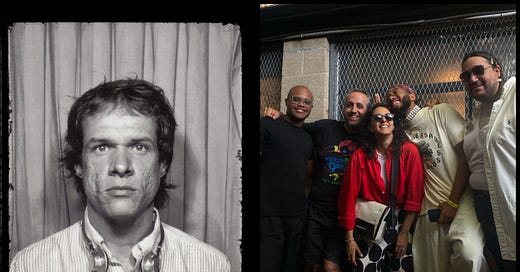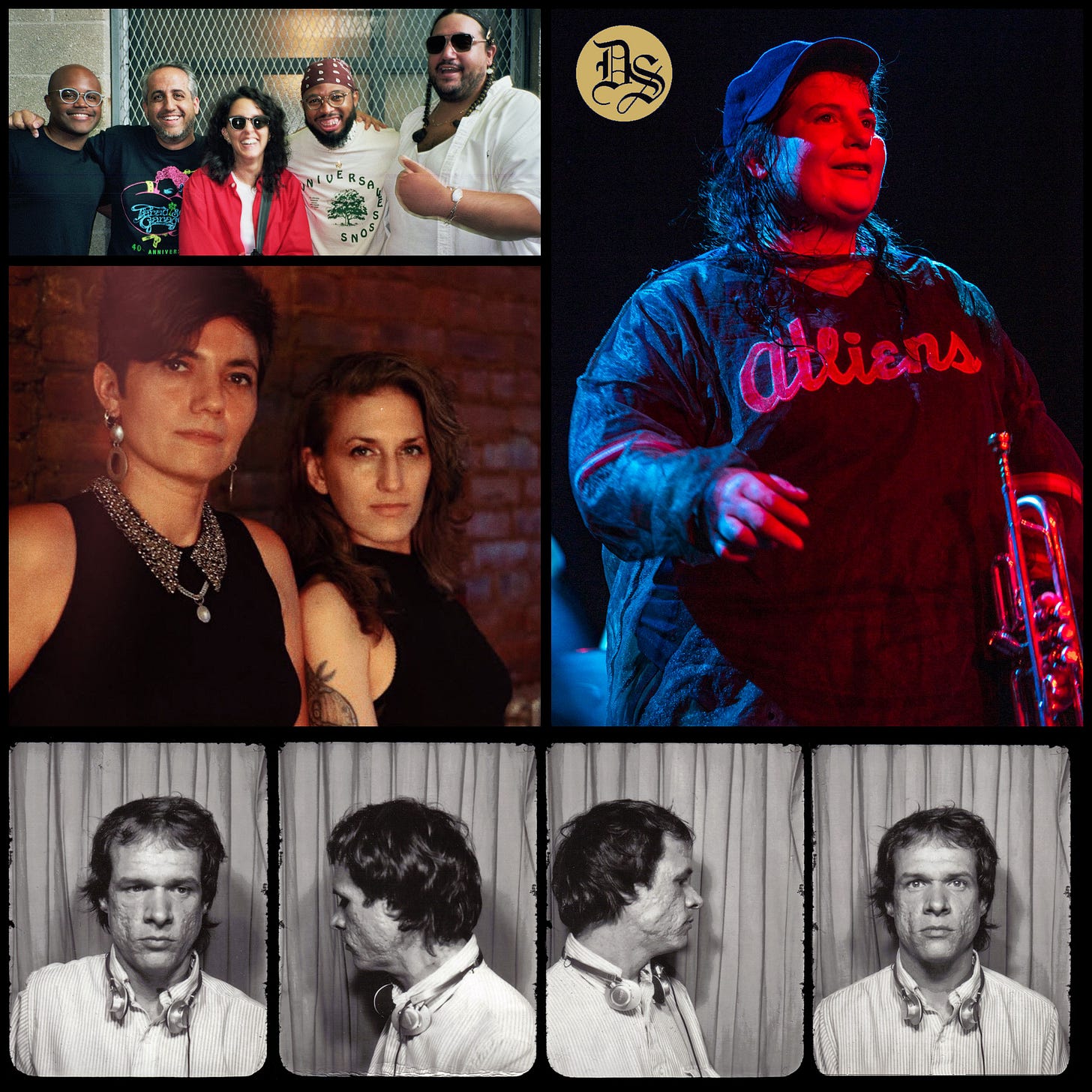Bklyn Sounds 9/27/2023 - 10/3/2023 + Reviving Arthur Russell’s “City Park”
Performance of a rare 1974 tape-works at New York City AIDS Memorial + Shows: Love Injection + musclecars + Toribio / AMFM + Wrens + Free Radicals + Qasim Naqvi / jaimie branch Fly or Die / +
Dear subscribers - apologies for the day-late Bklyn Sounds. This one’s been tough to finish. As I was in the final edits late Wednesday morning, I received tragic news from the veterinarian about our family cat, who at only 8 1/2 years old had been diagnosed with a brain tumor, confirmed by an MRI. The prognosis is dire, and the time left very short. Longtime readers are aware that there’s been a lot of illness and death around the Dada Strain family. This news has put the boot in once more, making concentrating on writing difficult. Again apologies to the readers, and especially to the musickers about whose work I could not get the word out in time.
Has a musical artist’s posthumous rise from obscurity ever had the speed and boldness that’s marked Arthur Russell’s reappraisal within the Downtown ideal? Cellist, experimental composer, disco producer, singer-songwriter, “bubblegum Buddhist,” avant-pop minimalist, but also just another casualty of the AIDS epidemic’s devastation. Arthur has gone from being a community’s unknown pleasure to one of the era’s key connector protagonists in just under two decades. Especially if the 2003-04 release dates of Soul Jazz’s great introductory comp, The World of Arthur Russell, that kick-started the whole thing, and the first two archival albums on Steve Knutson’s Audika label devoted to Arthur, are calendar markers to go by. It takes a village to pull off such a critical reassessment, and to Arthur’s great credit, he left his mark on numerous cliques. Once his music began seeing the light of day, receiving great critical responses, its eccentric-yet-accessible sound found bigger audiences. The hit documentary and excellent biography swelled his following, and Arthur Russell’s canonization into late-20th century New York cultural history was nearly complete. We now know Arthur!
Yet a curious thing happens when the archives drive the narrative: it continues to reveal details and weird new asides long after the story is supposedly told. Some of it is contextual, some hidden in plain sight, and some maybe just doesn’t fit the clean narrative. Arhur’s almost-universally unheard piece “City Park” (written circa 1973-74) is one of those. Saturday’s staging of it at the New York AIDS Memorial, led by musician/curator/scholar Nick Hallett and featuring a group of musicians split among members of Arthur’s 1970s-’80s cohort and their post-genre contemporaries, is likely to be its first public performance in nearly 50 years.
Hallett’s almost uniquely qualified to be the instigator here. He’s been a composer in numerous contexts, most recently as in-house music director with the Bill T. Jones Arnie Zane Dance Company. He’s curated sound across the “pop” spectrum, including at local arts organizations like The Kitchen (where Arthur was once music director, and where Hallett performed on and co-produced programs of Arthur’s work); but he’s also put together Joshua Light Show’s annual audio-visual treats at NYU. Hallett’s old colleagues with Matt Wolf, the director of the 2008 Russell documentary, Wild Combination, and where he says he discovered “City Park,” while reviewing unused footage of the film. In 2023, Hallett, who grew up queer during the AIDS epidemic, has also been guest-curating the live art at the AIDS Memorial in St. Vincent’s Triangle park, across the street from the long-gone hospital associated with the plague (and around the corner from The Center). Like Arhur work itself, Saturday’s production is an exquisite, artful connector of facts and personal stories that Hallett calls a “convergence best described as Kismet.”
It was curiosity about “City Park,” a piece Hallett says he read about but never heard, that was the primary kernel. “I just wanted to know more,” Hallett said. “Arthur obviously had very strong feelings about this piece, cause he talked about it more than 15 years after performing it. It obviously stuck with him, and the story of his clash with Charles Wuorinen had been really important.”
Wuorinen, an uptown serialist composer, was among Russell’s teachers at the Manhattan School of Music, the reason Arthur arrived in New York in 1973. “City Park,” a piece that used live instrumentation (including an ARP 2500 synthesizer) as well as processed taped recordings of Gertrude Stein and Ezra Pound’s poetry and live text recitation, was written as an exercise for Wuorinen’s class. David van Tiegham, one of Arthur’s long-time collaborators and a student at MSM at the time, confirmed that “City Park” was Arthur’s first experience with electronic music, but one that did not garner the teacher’s approval. “That’s the most unattractive thing I’ve ever heard,” Wuorinen is quoted as saying in Tim Lawrence’s Russell biography, Hold On To Your Dreams, in response to Arthur’s excitement for the piece.
“City Park” had been presumed to have gone untaped, but Hallett found two recordings in the Arthur Russell archives now housed at the New York Performing Arts Library. One was from an on-air performance for WKCR, Columbia University's great long-running station. Its other, more historically significant playing took place in April 1974, at WBAI’s “Free Music Store,” on a bill that also included the composer Christian Wolff (who’d play bass on Arthur’s piece, just as Arthur played on Wolff’s “Music for 1, 2 or 3 People” that day), the poet Jackson MacLow (who recited original text), and another celebrated Downtown composer, Rhys Chatham, who would soon bequeath his position as The Kitchen’s inaugural music director to Arthur — due in part, says Hasslett, to this presentation of “City Park.” “It provides a great deal of context of where Arthur was gonna go.”
Hallett emphasizes that Saturday’s performance will not attempt to be a “definitive version” or “historical re-enactment,” but an original update. It will bring together members of the late composer’s storied downtown cohort — Van Tiegham and Peter Zummo, who will be playing organ rather than his usual trombone — with a younger generation of Arthur Russell repertoire interpreters. Alex Waterman and Nat Baldwin have played Arthur’s music alongside Hallett. There is also a great new addition to the expanding line-up of Arthur Russell players: composer and multi-instrumentalist Lea Bertucci, currently a colleague of Hallett’s at Wesleyan University’s graduate composition program (and a long-time Dada Strain/Bklyn Sounds favorite), whose tape-manipulation and text-based practice is, in fact, crucial to “City Parks.”
Though Bertucci knew Arthur as “adjacent to the period’s experimental music scene and in dialogue with a lot of its artists,” she was primarily familiar with the cello and vocal music that created the central tenet of his story. She says “City Park” surprised her, and expects that on Saturday, another side of Arthur Russell will reveal itself to listeners. Also, that this is a good thing.
“A lot of people are going to attend this event expecting what they're familiar with, and I think their expectations are going to be shattered,” Bertucci says. “Not in a bad way. I think it's always good when you expect one thing and get something else. That's actually a nice thing about what experimental music can do. It goes to show what the range of Arthur Russell's work really was, where his mind was, all the different iterations of things he tried throughout his career. It shows a creative and intellectual curiosity that this piece is so different from the rest of his body of work. And I think that's something kind of lacking nowadays in a lot of artists — cultivating a range, doing different things and being interested in the world around us.”
Arthur Russell: City Park, Sat 9/30, 4p @ St. Vincent’s Triangle, Manhattan - FREE
BONUS BEAT: The Arthur Russell stans may remember that the composer, synth wizard, and community organizer Gavilan Rayna Russom participated in one of the more interesting takes on Arthur’s music in the mid-’10s, a live band which would perform music from an Audika release called “Instrumentals” — as well as Arthur’s “hits.” (That’s the tie-in, but also a shitty lede — sorry/not sorry.) Fast forward to 2020: Rayna founded Voluminous Arts, a “transgender liberation project” whose values of community-building and -support around the arts (especially, the experimental, electronic-rhythm arts) are deeply shared by Dada Strain. Up til now, Voluminous Arts as an organization has largely been funded by live shows and by Russom’s career in popular music (her prior participation in LCD Soundsystem, and various other projects). Now VA is trying to create a dedicated space and develop sustainable programming, to grow as a community organization. It is a very worthy cause. Please consider donating if you can.
This Week’s Shows:
Keep reading with a 7-day free trial
Subscribe to Dada Strain to keep reading this post and get 7 days of free access to the full post archives.



